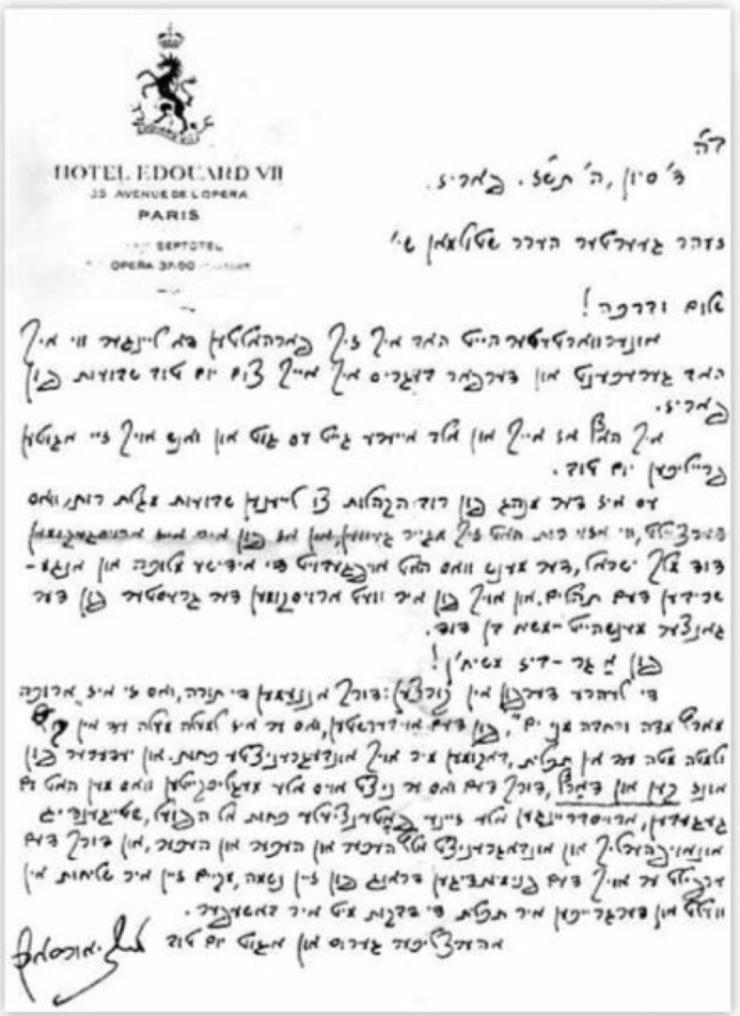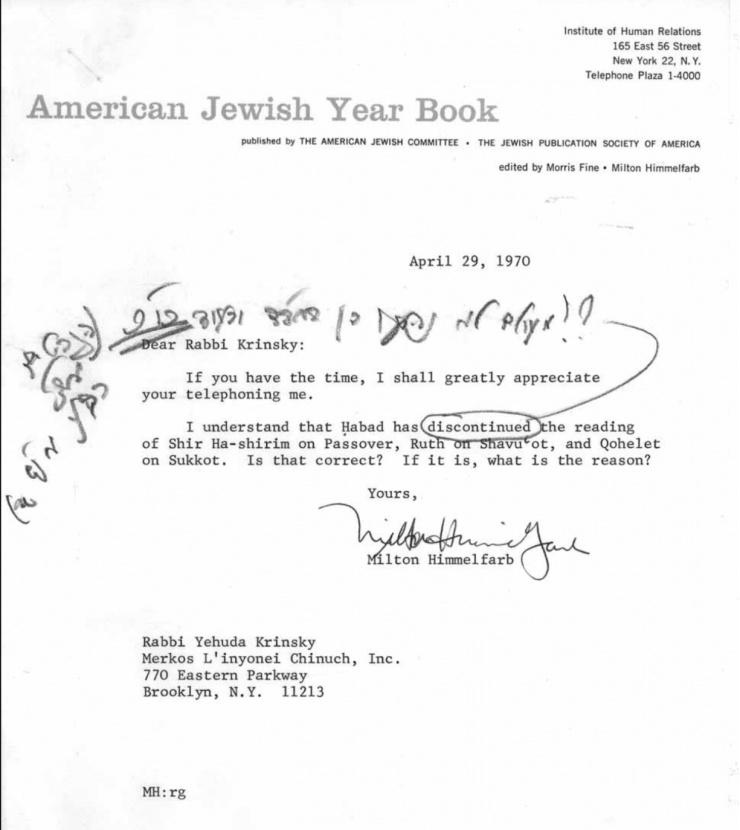Why Chabad Doesn’t Read Megilas Rus On Shavous
Three responses from the rebbe on topic of Rus and Shovuos. The first is regarding the matter of reading the Three Megillos (Shir Hashirim, Koheles, and Rus) during the Shalosh Regalim. The second includes a lesson from the reading of Megillas Rus by many communities. and the third is if Chabad discontinued the Minhag • Full Article
Why Chabad Doesn’t Read Megilas Rus On Shavous
In a letter written by Rabbi Uriel Zimmer to the Rebbe Melech HaMoshiach on 3 Sivan 5717 (1957), he asked the following:
Regarding the matter of reading the Three Megillos (Shir Hashirim, Koheles, and Rus) during the Shalosh Regalim – it is a custom founded in the words of the ancient sages, so much so that in some communities they even read it preceded by a bracha (so was the custom of the Vilna Gaon and so is the regular minhag in Yerushalayim). Now even though the Chabad custom, as well as of other Poilisher Chassidim, is not to read them in shul before Krias HaTorah, there is no doubt that a spiritual connection between these megillos and the Shalosh Regalim exists, and even the simple and obvious reason of this custom is known to everyone, especially the connection of Rus to Chag HaShavous.
I have one question about this which becomes two:
a) What is the reason they are not read [publicly] in shul?
b) Is there [instead] any fixed order or custom in reading or studying them during their time (Shabbos Chol HaMoed Sukkos and Pesach, and on the Second Day of Shavuos)? [I’m asking] because I did not find any mention of it in the “HaYom Yom” and in similar places. I also asked some of Anash and the tmimim sheyichyu and I did not find a clear answer.”
In answer to the first question, the Rebbe wrote (freely translated):
Neither has the Mechaber [=author of the Shulchan Aruch] cited this minhag. Most of the poskim who do cite it are of the opinion that it is “merely a minhag.”
[For an explanation of refraining from doing so see Mishna and Talmud at the beginning of Chapter Sixteen of Tractate Shabbos which states that Kesuvim shouldn’t be read on Shabbos and see as well as in Yerushalmi, Megilla 3:5. This is the reason we don’t read Megillas Esther on Shabbos even though its reading is obligatory. It is then understood why, how much more so, it was not established l’chatchila to read Kesuvim on Shabbos].
The Rebbe circled the words “before Krias HaTorah” and wrote:
At all. And neither Shir Hashirim nor Koheles. I have not heard of learning (or reading) them privately at home or the like on these specific Yamim Tovim. As to Shir Hashirim – some are accustomed to saying it on Erev Shabbos.
See more on this topic below.



“From a convert – until Moshiach!”
Mr. Julius Stulman was a generous supporter of the Markos L’Inyonei Chinuch, and as such was the addressee of many personal letters of the Rebbe. The following unique letter was written by the Rebbe to him, in full handwriting on the stationery of Hotel Edouard VII, before Shavuos of 5707 (1947) from Paris. The Rebbe was there at the time working on helping his mother Rebbetzin Chana emigrate to America. The letter includes a lesson from the reading of Megillas Rus by many communities. Freely translated from Yiddish for the first time:
B”H
4 Sivan 5707, Paris
Most honorable Mr. Stulman שי’,
Greeting and blessing!
Unexpectedly, I was delayed here longer than I had planned, and therefore, I extend my best wishes to you for the festival of Shavuos from Paris.
My hope is that all is well for you and yours, and I wish them a good and happy Yom Tov as well.
The custom in most communities is to read on Shavous the Scroll of Ruth, in which it is told how Ruth converted, and from her came David, the King of Israel, the person who established the Kingdom of Israel and who wrote the Tehillim. From her will also come the greatest of mankind – Moshiach, the son of David.
From a convert – until Moshiach!
The lesson from this in a nutshell: by accepting the Torah — which is “longer than the earth and wider than the sea” — from G-d, Who [extends] upward without bounds and downward without end, we also receive unlimited powers. And each of us can, and must, bring out all his potential powers by taking advantage of all the abilities that have been given to him to ascend without ceasing and without limitation higher and higher and higher. And by [doing] this he fulfills the inner desire of his soul — to fulfill its mission in the world and to reach its purpose, dveikus [=cleaving] with its creator.
With heartfelt regards and a Gut Yom Tov,
M. Schneersohn
Chabad Never “Discontinued” Reading Megillas Rus
In Nissan 5730 (1970), the editor of the “American Jewish Yearbook,” Mr. Milton Himmelfarb, was preparing a piece on the reading of Megillas Rus, and in a letter to Rabbi Yehuda Krinsky he wrote that “I understand that Habad has discontinued the reading of Shir Ha-shirim on Passover, Ruth on Shavuot and Qohelet on Sukkot. Is that correct? If it is, what is the reason?”
Rabbi Krinsky submitted his letter to the Rebbe, and the Rebbe responded thus:
?! מעולם לא נהגו כן בחב”ד ובעוד כו”כ (הפרטים אצל רבני אנ”ש שי’).
Circling the word “discontinued,” the Rebbe wrote a question mark followed by an exclamation mark, followed these words:
This was never customary in Chabad and in many other communities (the details can be clarified with Anash rabbanim שי’).



203
Join ChabadInfo's News Roundup and alerts for the HOTTEST Chabad news and updates!












































